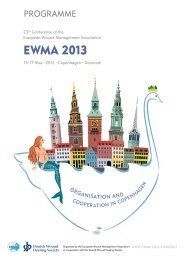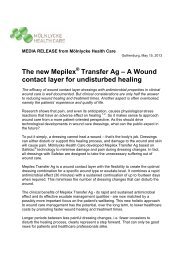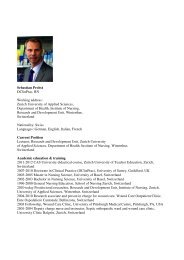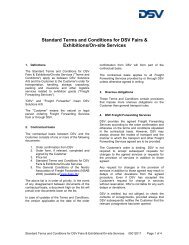Create successful ePaper yourself
Turn your PDF publications into a flip-book with our unique Google optimized e-Paper software.
Free Paper Session: Devices and Intervention<br />
67<br />
ARTERIOGENESIS IN ISCHEMIC WOUNDS USING ARTERIAL ASSIST<br />
COMPRESSION PUMPS<br />
Edward Arkans 1 , Andrew Nicolaides 3 , Paul van Bemmelen 2 , Christoffer Lattimer<br />
1 ACI Medical (San Marcos, United States);<br />
2 Vascular Screening Diagnostic Center (Nicosia, Cyprus);<br />
3 Temple University (Philadelphia, United States).<br />
Aim: To review the technology and clinical research supporting formation of collateral<br />
arteries in critically ischemic limbs using a form of intermittent pneumatic compression.<br />
Methods: Randomized controlled trials and physiological studies are reviewed and<br />
discussed.<br />
68<br />
Free Paper Session: Devices and Intervention<br />
WOUND DECHRONIFICATION WITH NEGATIVELY CHARGED MICROSPHERES<br />
– FINAL Results OF A RANDOMIZED, PROSPECTIVE, DOUBLE BLIND,<br />
MULTICENTERED STUDY<br />
Yaron Shoham 1 , Leonid Kogan 2 , Jerry Weiss 3 , Eran Tamir 4 , Yuval Krieger 1 ,<br />
Yoav Barnea 5 , Eli Regev 6 , Natalia Haikin 2 , Amir Inbal 7 ,<br />
Alexander Bogdanov-Berezovsky 1 , Eldad Silberstein 1 , Gabriel Zeilig 8<br />
1 Department of Plastic and Reconstructive Surgery and Burn Unit, Soroka University<br />
Medical Center (Be’er Sheva, Israel);<br />
2 Plastic Surgery Unit, Western Galilee Hospital (Naharia, Israel);<br />
3 Division of Plastic and Reconstructive Surgery, Tel Aviv Sourasky Medical Center<br />
(Tel Aviv, Israel);<br />
4 Maccabi Health Services (Tel Aviv, Israel);<br />
5 Breast Reconstruction Unit, Tel Aviv Sourasky Medical Center (Tel Aviv, Israel);<br />
6 Hard to Heal Wounds Clinic, Sheba Medical Center (Tel Hashomer, Israel);<br />
7 Plastic and Reconstructive Surgery Department, Tel Aviv Sourasky Medical Center (Tel<br />
Aviv, Israel);<br />
8 Neurological Rehabilitation Department, Sheba Medical Center (Tel Hashomer, Israel).<br />
Aim: We report the final analysis of a multicenter, prospective, double-blind, randomized<br />
controlled study comparing the efficacy and safety of Negatively Charged Microspheres*<br />
(NCM) to control (saline soaks) in the treatment of hard-to-heal wounds of different<br />
etiologies.<br />
Methods: Patients with at least one hard-to-heal wound, defined as refractory to healing<br />
for at least four weeks, or wounds with exposed bones, tendons or ligaments, were<br />
eligible for the study and randomized to NCM or control, both applied twice daily for four<br />
weeks. Patients were monitored bi-weekly for eight additional weeks while treated by<br />
standard wound care at the investigators’ discretion. The primary endpoint was defined<br />
as coverage of >75% of the wound area by light-red granulation tissue after four weeks<br />
of treatment.<br />
Results: Fifty-eight patients completed the study, 32 in the NCM group and 26 in the<br />
control group. In the NCM group 46.9% of patients achieved >75% light red granulation<br />
tissue after 4 weeks compared with 15.4% of patients in the control group (p=0.01). The<br />
mean wound surface area in the NCM group was reduced by 39% after 4 weeks<br />
compared with 14.9% in the control group (p=0.02).<br />
Conclusion: This study demonstrates that compared to control treatment, NCM<br />
treatment of hard-to-heal and chronic wounds improves formation of healthy granulation<br />
tissue and reduces wound size by ”dechronifying” the chronic wounds and “kick-starting”<br />
the healing process.<br />
* NCM is distributed as PolyHeal by MediWound LTD<br />
Results: Permanent improvements are demonstrated by healed wounds (97%),<br />
resolved rest pain (100%), limb salvage (86–94% at 1.5 to 3.5 years), increased toe<br />
pressure (15.5mmHg), increased popliteal artery flow (20.5 cm/sec) and formation of<br />
collateral arteries with angiographic evidence.<br />
Discussion: There are few medical treatments available to patients with critical limb<br />
ischemia unable to undergo surgical intervention. A body of evidence has emerged that<br />
shows how collateral artery growth (arteriogenesis) is created. Arterial assist pumps<br />
rapidly apply high pressures to the foot, ankle and calf.<br />
There are several mechanisms of action identified by which these pumps support<br />
arteriogenesis for chronic improvement and acutely increase tissue blood flow for more<br />
immediate ischemic pain relief. 1. The arterial-venous pressure gradient is increased. 2.<br />
The induced endothelial shear stress releases nitric oxide and causes arteriolar<br />
vasodilatation and reduced peripheral resistance. 3. Longer term usage leads to<br />
expression of growth factors responsible for collateral formation and permanent<br />
reduction of ischemia.<br />
Conclusions: Limb salvage studies on non-reconstructable patients show significantly<br />
reduced major amputation rates with wound healing and elimination of rest pain. Earlier<br />
randomized controlled trials showed permanent improvements in pain free walking<br />
distance for claudicants. Results were as good as or better than those obtained in<br />
supervised exercise programs.<br />
FREE PAPER SESSION: DEVICES AND INTERVENTION<br />
<strong>EWMA</strong> <strong>2013</strong><br />
COPENHAGEN<br />
15-17 May · <strong>2013</strong><br />
Danish Wound<br />
Healing Society<br />
53






